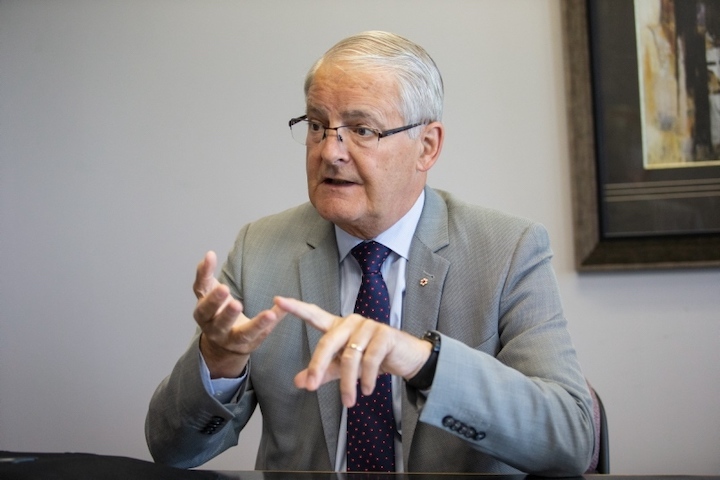30.07.2019


Marc Garneau wishes we could all see the world through his eyes.
Canada’s first man in space is convinced that getting a new perspective — via an out-of-this-world experience — would make all the difference when it comes to humanity’s attitude toward the planet and the steps it might be willing to take to save it.
“I think the more people that go into space, the better the future of humanity will be,” said the federal transport minister, who was in Victoria this past week to make a series of announcements on environmental remediation, international trade and marine communication.
“Back in the ’70s, ’80s and ’90s, the only people who put money into space were the governments, because the private sector didn’t see anything in it for them — they also didn’t have the deep pockets that the Bezoses, Musks and Bransons have now,” he said, referring to Amazon founder Jeff Bezos, Tesla chief executive and SpaceX founder Elon Musk, and Virgin founder Richard Branson. “Now, governments are encouraging the private sector to get involved.”
Garneau said no government has the money to fund the myriad satellites the private sector has sent into space to relay information, improve communication and observe Earth.
And while he understands that some might bemoan the loss of the mystique and wonder associated with space travel if private firms such as SpaceX make trips to space the norm for civilians with big enough bank accounts, Garneau is all for it.
“All astronauts who do go into space come back imbued with this sentiment that we really do have to take care of our planet because we have seen it,” he said. “It’s the cradle and home of all of humanity and it’s surrounded by space and there’s nowhere else to go.
“And if we destroy it because of not taking care of our oceans and atmosphere, it will be the end of us.”
If more people go up into space, he said, it can have a positive benefit.
Even if space travel for the masses is a long way off, Garneau remains optimistic for humanity.
“As human beings, we are sometimes slow to get the message, but when we do, at some point we turn the corner and start to act,” he said. “Do we do it fast enough to avoid some damage? Maybe not, but ultimately, I think we do the right thing.”
Garneau, who was on shuttle flights in 1984, 1996 and 2000, says that time in space — 677 hours in total — drove home the fragility of the planet.
“I have been talking about the environment for 35 years, since my first mission,” he said, noting he has seen the thin line of atmosphere that allows the Earth to sustain life. “Someone once likened it to that dry outer layer of an onion — so thin that skin, but it allows life to exist on the planet and if we destroy it, we’re doomed.”
Garneau, whose trip to Victoria was just a few days after the 50th anniversary of the moon landing, said he had frequently been solicited over the past week for thoughts on the event. He knew Neil Armstrong and knows Buzz Aldrin.
“I was glad to participate in the commemoration of what I think was the greatest technological achievement of the 20th century,” he said, noting he used the opportunity to point out to audiences and media how much Canada contributed to it.
He said when the Avro Arrow program was cancelled by the Canadian government in 1959, many of the engineers and scientists who worked on it were hired by NASA and made important contributions to the Mercury, Gemini and Apollo programs.
As for the personal impact of the moon landing, Garneau said it likely planted a seed. Then a Royal Military College student, he and a crew of 13 had just crossed the Atlantic Ocean in a 59-foot sailboat.
“I was in the middle of the English Channel,” he said. “I remember I was looking up at the moon and listening to a radio as Neil Armstrong set foot on the moon.
“I certainly could not have anticipated going into space at that time. I was in an old form of transport, and imagining like everyone else here that a human from Earth was setting foot on the moon.
“That just blew me away.”
Garneau hopes that in his current role as a cabinet minister, he and the Liberal government are making a difference for the good of the planet.
He cited work on the Oceans Protection Plan, the moratorium on tanker traffic on B.C.’s northwest coast, bills to deal with abandoned vessels and strict rules around oil tanker traffic to assuage fears over the increase expected if the Trans Mountain Pipeline expansion comes to pass.
It’s work he hopes the B.C. public will appreciate is being done in the name of the planet.
“[Earth] is all we’ve got,” he said. “Ultimately we will move off the planet. But not tomorrow.”
Quelle: TIMES COLONIST
During an hour-long interview that covered the imminent election, the rise of populism and tanker traffic in the Salish Sea, the 70-year-old former astronaut perked up at the mention of space — and especially the privatization of space.
